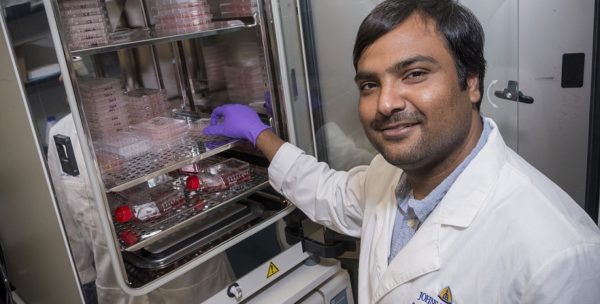Learn about the research that our team conducts and how we are working to solve the problems of diabetes.
Research Projects

Can We Interrupt Disease Development and Progression?
Our research team is working in harmony with other scientists and organizations in a number of projects to identify targets in the immune system that are involved in the development of Type 1 Diabetes. We have discovered a new lymphocyte (immune cell) that is significantly elevated in people with Type 1 Diabetes that appears to very efficient in stimulating the immune system to attack insulin-producing cells. Our studies look at these cells and other molecules to determine whether targeting it will interrupt disease progression, protect high-risk individuals, and possibly stop auto-immune disease in its tracks at onset. This approach is based on data in the mouse model of the disease and human samples.
We use donated organs provided by the Network of Pancreatic Organ Donors with diabetes (nPOD), fresh blood samples from patients here at Johns Hopkins and samples provided by our collaborators at other institutes in the US and Italy.

Our Findings
The data we are collecting from patients is encouraging and corroborates our hypothesis. Specifically, we see significant elevations of these targets (molecules and cells of interest) in Type 1 Diabetes patients, but not in the healthy controls. The novel nature of this discovery could provide a paradigm-shift in the modern perception of the pathophysiology of Type 1 Diabetes.
Currently, we are working on the characterization of these cells to understand more about their exact role in the disease process. With further studies, these cells could possibly be used as a biomarker that distinguishes at risk-individuals that will go on to develop Type 1 Diabetes. Targeting of these cells could also provide a modulator whose blockade would not suppress the immune system and possibly prevent the development and progression of Type 1 Diabetes in at-risk and new onset individuals.
For our published research, please visit our publications.
Recently Published Research
- Giwa AM, Ahmed R, Omidian Z, et al. Current understandings of the pathogenesis of type 1 diabetes: Genetics to environment. World J Diabetes. 2020;11(1):13‐25. doi:10.4239/wjd.v11.i1.13
- Hamad ARA, Sadasivam M, Rabb H. Hybrid lipids, peptides, and lymphocytes: new era in type 1 diabetes research. J Clin Invest. 2019;130(9):3527‐3529. Published 2019 Aug 5. doi:10.1172/JCI130313
- Omidian Z, Ahmed R, Giwa A, Donner T, Hamad ARA. IL-17 and limits of success. Cell Immunol. 2019;339:33‐40. doi:10.1016/j.cellimm.2018.09.001
- Ahmed R, Omidian Z, Donner T, Hamad ARA. Hiding in plain sight: time to unlock autoimmune clues in human CD5+ B cells by using next gen technology. Discov Med. 2018;26(142):79‐83.
- Saxena A, Yagita H, Donner TW, Hamad ARA. Expansion of FasL-Expressing CD5+ B Cells in Type 1 Diabetes Patients. Front Immunol. 2017;8:402. Published 2017 Apr 7. doi:10.3389/fimmu.2017.00402
- Fousteri G, Ippolito E, Ahmed R, Hamad ARA. Beta-cell Specific Autoantibodies: Are they Just an Indicator of Type 1 Diabetes?. Curr Diabetes Rev. 2017;13(3):322‐329. doi:10.2174/1573399812666160427104157

